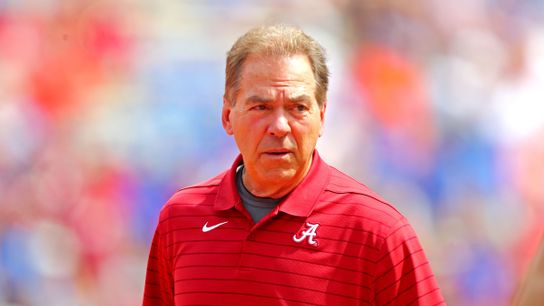In case you haven't noticed, there's an ecosystem that exists inside the college football media any time anyone in college sports suggests a change or actually succeeds in changing a rule -- particularly in the realms of recruiting and staff hiring practices.
How it works is this: someone suggests a change, and then reporters fan out to coaches, ADs and (sometimes) players and recruits to collect their reactions. Someone always gets Nick Saban's reaction, and he usually hates whatever change is on the way.
This time around, Big 12 commissioner Bob Bowlsby suggested that, in addition to the December signing date added for this year, the NCAA should install an in-season signing period.
"I think you could end up with a signing window, where you say, We’re going to do visits in April, May and June, we’re going to go to camp. If you want to get the recruiting process over the institution can issue a letter of intent, you have 14 days to sign it," Bowlsby said at Big 12 media days on Monday. "Maybe the window runs from October 1 to November 15, or maybe it runs from September 1 to November 1, and you get it over before the postseason. I don’t know why there’ can’t be a window where you offer the scholarship that the student-athlete wants to conclude the recruitment process and the institution knows that they’d like to make a decision, go ahead and do it."
That plan is just one man's opinion, but as both a member of the NCAA's Division I Council and chairman of the Football Oversight Committee, Bowlsby's opinion matters more than almost anyone else's.
CBS Sports's Dennis Dodd has a piece out today that gauges the fallout of Christian McCaffrey and Leonard Fournette's decisions to skip their bowl games to get a jump start on NFL Draft preparation. (Spoiler alert: They don't like it, but they begrudgingly understand it.)
Saban tied that phenomenon to Bowlsby's signing period opinion.
"Same thing will happen in high school if they make the signing day before the season," Saban said. "It will take a few years, then some kid will say, 'Hey, I'm going to Notre Dame. I'm not playing my senior year.'
"Then the high school coach will go nuts."
My rebuttal to Saban point is: Isn't it your job to stop that?
Verbal offers typically come with the understanding that the player will continue to compete for his high school team at the highest level he can, under the (spoken or unspoken) threat of the school pulling his offer and giving it to someone else. If the wording of the National Letter of Intent doesn't allow for college coaches to revoked signed scholarship papers, Saban and other college coaches can still make it clear that a signed-and-delivered scholarship is not a green light to quit playing for your high school team, and violators will experience, if not a removal of their scholarship, other consequences once they arrive on campus.
The counterpoint to that would be: Well, what's stopping a player with signed scholarship papers from from using an "injury" to remove himself from competition?
The counterpoint to that counterpoint would be: What's stopping them from doing that exact thing right now?
Estimates say 70 percent of players have committed by October 1 of their senior year. How many of those guys get their offers pulled due to injury?
This entire conversation, both in what's happening now in college football and a hypothetical debate of what might happen in high school football, operate on the fringes outside the mainstream. Very few players are good enough to do what McCaffrey and Fournette did and get away with it (and even then, Fournette says he was too hurt to play in the Citrus Bowl; he was banged up for most of last season anyway.) There's a reason those two went fourth and eighth overall in this spring's draft.
And for every McCaffrey there's at least one Solomon Thomas, who does not go third overall to the San Francisco 49ers without an off-the-charts-good Sun Bowl performance.
Ultimately, the vast majority of players want to play because A) they like playing football and B) they want to help their teammates beat the other guys.
Yes, there may be a fringe that views a rule change as an opportunity to shortcut the system, but the fear of that shouldn't stop a rule change that would benefit players (if, indeed, the oversight committee deems it would.... if the committee finds that it wouldn't help players then let's just all agree to delete this entire debate from our brains). And if it makes Saban's life more difficult, well, that's why he gets paid $11.5 million, isn't it?
